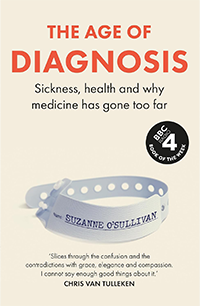Book review - The Age of Diagnosis: sickness, health and why medicine has gone too far
Denise Winn reviews 'The Age of Diagnosis: sickness, health and why medicine has gone too far' by Suzanne O’Sullivan (Hodder Press) £22.00

This is such a valuable, insightful book. NHS consultant neurologist Suzanne O’Sullivan respectfully picks apart the rash of questionable illness states being diagnosed prolifically today, asking whether this is truly helpful if better health or wellbeing for the recipients doesn’t ensue. (It was eye-opening to me that, apparently, even diagnoses of established medical conditions can be as much art as science.)
O’Sullivan is concerned about overdiagnosis – detection of a medical problem at a stage when medical treatment is not required and so nothing useful can be done – and over-medicalisation – “when ordinary human differences, behaviour and life stages are given medical labels, turning them into the business of doctors”.
Not all early cancer cells progress to become cancer but more early screening leads to what is often unnecessary treatment, with all the terror, disruption and anxiety for the future that comes with it. Even genes associated with higher risk of cancer do not indicate that cancer will necessarily develop. For other conditions, drugs may be taken that confer little benefit but could do harm. And we all know what treatments diagnosis of ‘conditions’ such as prediabetes or osteopenia (the bone changes that occur naturally as we age and may precede osteoporosis), attention deficit or depression arising from life circumstances may lead to.
O’Sullivan’s main focus is on conditions that have always existed in moderate or severe forms, including autism, ADHD, depression and many physical disorders, such as Lyme Disease and Ehlers-Danlos syndrome (EDS), but which are now being diagnosed at an astoundingly increasing rate in mild versions. More than 85 per cent of children worldwide now diagnosed with ADHD are in the mild or moderate group; the previously very rare connective tissue disorder EDS has 13 subtypes, only one of which is not associated with objectively observable biochemical change in connective tissue: the hypermobile variety. Between 80 and 90 per cent of people now diagnosed with EDS have this one.
Added into the mix is the huge growth in cases of long covid: “Long covid was patient-created – the first disease to arise from a thread of conversation on Twitter”, observes O’Sullivan. It is sometimes diagnosed even in people who may never have had covid – self-reported covid infection is more likely to lead to long covid than laboratory-confirmed infection, according to French research. And then there are afflictions such as the popular PoTS (postural orthostatic tachycardia syndrome), which causes dizziness or fainting on standing up, and the general pathologising of normal human emotion.
O’Sullivan is always even handed. For every example she gives of someone who feels their life has been blighted by a diagnosis that they can do nothing about or by unnecessary precautionary treatment, focusing them unhealthily and anxiously on their bodies, there is someone else who claims benefit from some form of treatment, or relief just to put a name to what they are experiencing, or is overjoyed and galvanised by finding their ‘tribe’.
But where, she wonders, are all those people with PoTS and hypermobile EDS who went undetected before diagnosis became available in the 1990s? “There is no large group of middle-aged and older people with chronic undiagnosed connective tissue and autonomic disorders, who are suffering the after-effects of a missed diagnosis in adolescence. If they grew out of hEDS and PoTS naturally, then is the diagnosis really needed? Few people with hypermobile EDS experience serious disability. However, there is a small subgroup of people given these diagnoses who respond very negatively to them. People like my patients who develop severe disability that is unlikely to be caused by the disease process but rather by the act of being labelled.” Psychosomatic illness is, as we know, every bit as disabling as any other kind.
O’Sullivan is concerned, along with colleagues from various disciplines, about diagnosis creep, which allows for more and more symptoms to be added to the symptom pool (autism manifests very differently today than it did in Kanner’s time) with sufferers having so little in common that it becomes impossible for research to home in on likely causes or useful treatments. Those who are severely disabled with a condition now swamped with mild versions must vie for the essential resources they really cannot live without.
It all makes salutary reading. But the ending is encouraging and highly HG: “We should seek wellness not through a diagnosis that reinforces what we cannot do but through hobbies, interests, passions and social networks that remind us what we can do.”
Latest Tweets:
Tweets by humangivensLatest News:
HG practitioner participates in global congress
HG practitioner Felicity Jaffrey, who lives and works in Egypt, received the extraordinary honour of being invited to speak at Egypt’s hugely prestigious Global Congress on Population, Health and Human Development (PHDC24) in Cairo in October.
SCoPEd - latest update
The six SCoPEd partners have published their latest update on the important work currently underway with regards to the SCoPEd framework implementation, governance and impact assessment.
Date posted: 14/02/2024











